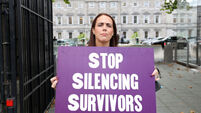Sarah Benson: Women are not afraid of the dark. They're afraid of violent men

Sarah Benson, CEO of Women’s Aid: 'We need a zero tolerance to all forms of male violence against women, and it will take all of us to commit to lasting change.' Picture: Paul Sharp
We’ve been here before. Flowers laid at the scene. Condolences expressed. Beautiful pictures shared of a woman whose live has been cruelly cut short.
This time, the poignant phrase ‘she was going for a run’ gained traction on social media and at vigils for Ashling Murphy, capturing the shock that a woman could lose her life in such ordinary circumstances.
















